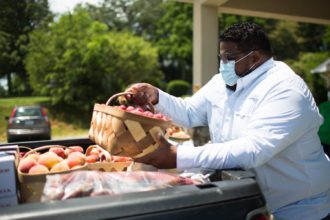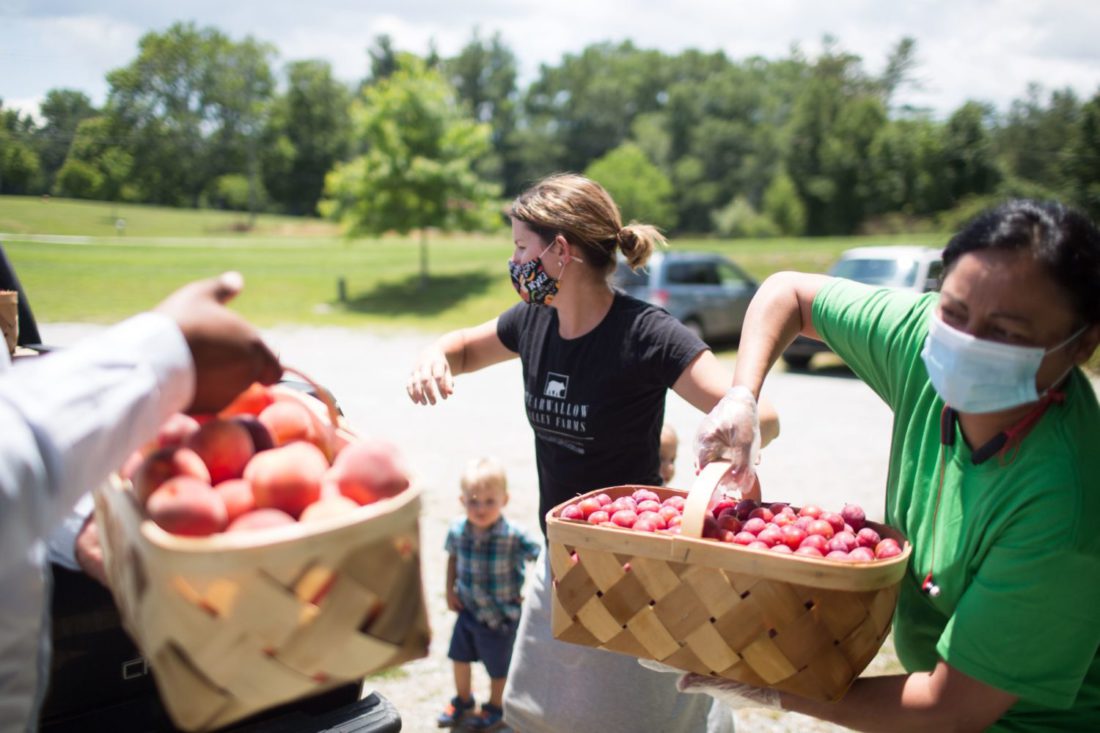By Melissa Reardon, originally published by Carolina Public Press. Carolina Public Press is an independent, in-depth and investigative nonprofit news service for North Carolina.
In early spring, before the unimaginable circumstances brought on by a global pandemic and crippling economic shutdown, farmers in Western North Carolina and across the state were already sowing their seeds.
In planning their fields, farmers must consider their various income streams such as wholesale accounts with grocers and restaurants, potential sales at farmers markets and community-supported agriculture memberships, also known as CSAs. Determinations on the amount and types of crops grown are guided by those early predictions.
But farmers had not reckoned with the economic impact of COVID-19, which has caused farmers grave financial setbacks and interruptions in supply chains. Now, what many farmers are facing, as vegetables ripen in the fields, is a surplus of product and a need to distribute it for a profit.
At the same time on the consumer side, the need for food assistance has risen sharply.
This is where Asheville-based agriculture aid nonprofit Appalachian Sustainable Agriculture Project has stepped up to do what it does best: support Southern Appalachian farming communities by building connections to locally grown food.
ASAP’s recently announced Appalachian Farms Feeding Families program connects farmers in Western North Carolina with smaller-scale food relief efforts, providing funding that covers costs to farmers.
“Our communities are facing unprecedented challenges right now, with families struggling to access fresh foods,” said ASAP Executive Director Charlie Jackson.
“Farms are entering the time of year where production is high, but many have lost market outlets with closures or reduction of service in restaurants, schools and other institutions. This is a neighbor-helping-neighbor effort that can benefit everyone in the community.”
How the program works
In early April, ASAP launched the Appalachian Grown Farmer Relief Fund, financed by individual and business donations and with funding from the Community Foundation of WNC.
According to ASAP communications coordinator Sarah Hart, so far the fund has supported area farmers in several ways. It’s helped reopen some 40 farmers markets, supplementing costs for safety necessities like additional signage, traffic cones and hand-sanitizing stations.
It has provided grants to farmers who have been forced to pivot part of their business, funding needs as varied as refrigeration or an e-commerce site.
The relief fund has also offset bulk packaging costs, allowing farmers to purchase the Appalachian Grown branded promotional materials from ASAP at a 25% discount. The packaging had previously been sold at cost.
The Farms Feeding Families program is the latest rollout of that relief fund and is expected to pay out up to $125,000 — the largest portion of the fund — which will go to participating Western North Carolina farmers.
The program works this way: ASAP matches a food relief effort — including food banks, child and adult care feeding assistance sites, and charitable prepared-meal services — with a nearby farm that can best fill its specific needs. ASAP acts as the liaison to bridge that connection.
In some instances, a farm may be able to donate surplus food but needs help with packaging; others require the financial support of distributing their goods at full price. In both instances, the new program is helping with the logistics and subsidizing the costs so that both the farmers and families benefit.
“Food assistance is a need that is always there, pandemic or not, but there are a lot of logistics involved. ASAP has not been able to step in and do this before, but we saw an opportunity for it to work now,” Hart said.
“What we saw early on (with the pandemic) was national stories of farmers digging up and discarding crops or dumping their milk,” she said, pointing to a breakdown in supply chains that left surplus goods going to waste.
“On the local level, supply chains had not yet been impacted in the same way, but we saw that that could happen here at the height of production time.”
The program’s early groundwork involved getting farmers to participate but also connecting with the feeding sites to identify their needs.
Through its Growing Minds farm-to-school program, ASAP already had a network of child nutrition programs that it works with. But to expand on that, ASAP turned to WNC’s two largest food banks, MANNA FoodBank and Second Harvest of Northwest NC, to identify the smaller food pantries and organizations that lack convenient access to fresh produce.
“The big point is that food is going to these smaller sites without having to be routed through the larger sites like MANNA, which is not the best way to get produce out to people,” Hart said.
MANNA serves as a redistribution hub that gathers food and pushes it out through several hundred smaller feeding sites, a process that takes more time than direct delivery.
Currently, 50 food relief agencies are ready to be matched with farms. Hart says the goal is to work with 100 relief organizations and match them with 30-50 farms. The program rollout, which begins this week, focuses first on WNC’s most rural communities that are farthest from centralized food sources. ASAP plans to implement the program in each of the 23 counties it services throughout Western North Carolina.
Case in point

Farmers Nicole and Brent Coston of Bearwallow Valley Farms in Hendersonville were among the first to sign on. They experienced a 75% loss in their CSA fares under the pandemic, and to donate outright to a food pantry wasn’t feasible, as it didn’t even cover their labor costs. They also lost wholesale accounts with restaurants and day care centers that remain closed.
Nicole, who is also a registered dietitian, has a background in food insecurity, having worked to build and serve as the director of the YMCA of WNC’s nutrition program, which operates one static and two mobile food pantries. She also worked for WIC, the U.S. Department of Agriculture’s supplemental nutrition program for women, infants and children, before becoming a full-time farmer.
“I think this was all of the pieces of the universe falling in line,” Nicole Coston said. “It wasn’t even a question when I was asked to participate. We were looking for a solution, trying to figure out where our product would go. There’s only so much volume you can take to the market and sell.”
Bearwallow Farms was matched with Hendersonville Spanish Church, which is just 10 minutes away and services four predominantly Hispanic congregations across Buncombe and Henderson counties — a total of about 325 people.
According to Pastor Rubi Pimental, the Seventh-Day Adventist church partnered with MANNA FoodBank last November to launch its food pantry. But once the pandemic hit, the number of people needing assistance tripled.
Thanks to the partnership with ASAP and Bearwallow Farms, Pimental says the church is able to maximize its resources. It has received relief grant funding, which is helping church members with rent and utility bills. Nonperishable goods can still be sourced from MANNA, but receiving fresh produce, he says, is so important.
Of the 150-175 families the church is now assisting because of the pandemic, Pimental said 75% are single parents, mostly moms with children.
“You want to give them fresh food, especially the kids,” he said. “This is a blessing for the children to eat fresh produce.”
Every two weeks, the church receives a menu of produce from which to order and has $1,000 to spend. It’s also simple for the Costons, who package and deliver the goods, and invoice ASAP.
In the past, the church also has assisted its members with rent and utility bills — costs previously covered through donations. But those needs, too, have increased and are now being supplemented by relief grants during the pandemic.
Pimental is particularly grateful for the partnership with ASAP and Bearwallow Farms, as it has allowed the church to maximize its resources while also providing fresh produce to those in need.
Pimental says the church has received grants that are now helping cover 70% of its members’ basic needs but that the partnership with ASAP and Bearwallow Farms has been a huge blessing.
How to get involved
Farms and relief agencies that would like to participate are encouraged to fill out an interest form at asapconnections.org. And the general public can support this effort by donating to the Appalachian Grown Farmer Relief Fund, also online.
While each farmer-feeding site match may work differently depending on the specific needs and agreement, those involved say the model offers a win-win for all, including keeping money in the local economy.



Before you comment
The comments section is here to provide a platform for civil dialogue on the issues we face together as a local community. Xpress is committed to offering this platform for all voices, but when the tone of the discussion gets nasty or strays off topic, we believe many people choose not to participate. Xpress editors are determined to moderate comments to ensure a constructive interchange is maintained. All comments judged not to be in keeping with the spirit of civil discourse will be removed and repeat violators will be banned. See here for our terms of service. Thank you for being part of this effort to promote respectful discussion.